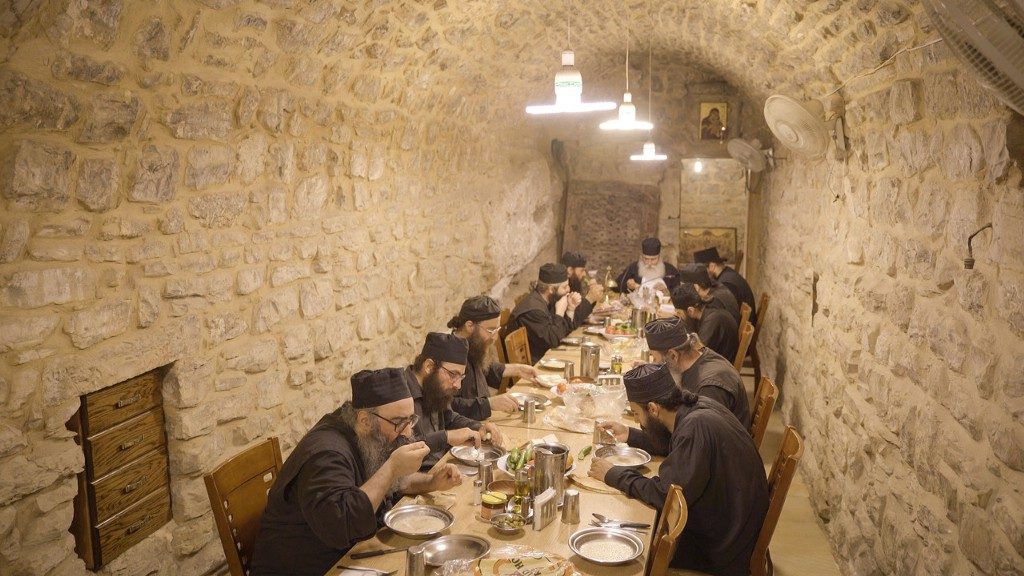Celia Peterson is a photographer and documentary filmmaker. Currently based in Dubai, she works predominantly in the Middle East shooting a range of documentary photographic and film assignments.
“The Good Struggle” will premiere at the 2018 Full Frame Documentary Film Festival on April 7.
W&H: Describe the film for us in your own words.
CP: “The Good Struggle” is an intimate and rare portrayal of a Greek Orthodox monastic community in north Lebanon. The monks reveal their daily monastic routine and past lives before they left the secular world.
W&H: What drew you to this story?
CP: I studied Comparative Religion at the University of Manchester, and although I am secular, I find myself drawn to religious subjects, especially having spent 14 years living in the Middle East.
I was living in Lebanon at the time and decided to visit this monastery. At the beginning, I did not know if there would be a film or not, but the stories of the monks and the beautiful simplicity of their lives and the surroundings kept me there — along with their generous hospitality.
The monastery is a 40-minute walk up a mountain. It is translated as “the mountain or ardor or enthusiasm,” so it always felt like a special event to go there.
I loved the characters of the different monks and began to wonder why they left the secular world, what their past lives might have been, and what their families think when they see them.
W&H: What do you want people to think about when they are leaving the theater?
CP: I would like people to question their priorities in life and how they would like to be remembered after they depart this world.
W&H: What was the biggest challenge in making the film?
CP: My Arabic is far from fluent, so the language barrier was an issue. I produced this film solo so that of course comes with its own technical issues when juggling filming, sound, and interviewing.
In terms of story, it was complicated trying to balance making an interesting film with keeping the monastery happy.
Walking up the mountain for an hour in the Lebanese summer with all of my filming gear was also a good healthy challenge!
W&H: How did you get your film funded? Share some insights into how you got the film made.
CP: This film was funded by my commercial photographic work. It cost $6,000 USD in total. I was very lucky to gain the support of various people in the post-production stage who helped me keep the budget so low: Miles Studio in Dubai who graded and sound mixed, and Rym Noujaim-Saade who spent a few days with me fine tuning the edit.
The monastery also allowed me to stay in their woman’s room, usually only available on the weekends, and fed me with gorgeous food from their land.
W&H: What does it mean for you to have your film play at Full Frame?
CP: Having my first film shown at Full Frame on the big screen to a paying audience is an honor, and I am really excited by the opportunity. It will be great to hear the feedback, watch the other films, and meet lots of other doc lovers.
W&H: What’s the best and worst advice you’ve received?
CP: Worst advice: As a Director and Director of Photography, I am quite often advised on filming gear. As a woman, I have to be quite careful as the rigs can become too heavy. [Thanks to bad advice,] I have definitely burnt some cash on the wrong gear in the past.
Best advice: Not sure I can think of any stand-out advice. I moreso remember those who have positively encouraged me.
W&H: What advice do you have for other female directors?
CP: Do it.
W&H: Name your favorite woman-directed film and why.
CP: I don’t have favorites as many documentaries inspire me for different reasons. One I saw recently, “One of Us,” by the women who did Jesus Camp — Rachel Grady and Heidi Ewing — was a wonderful film about three Hasidic Kews in NYC who want to leave their community and what subsequently happens in their lives.
I found it to be an incredibly powerful film, beautifully shot, an interesting insight into a very different life path and so emotionally tense. The characters allowed the director to be with them at their weakest, most raw moments in their lives.
W&H: Hollywood and the global film industry are in the midst of undergoing a major transformation. Many women — and some men — in the industry are speaking publicly about their experiences being assaulted and harassed. What are your thoughts on the #TimesUp movement and the push for equality in the film business?
CP: #abouttime







